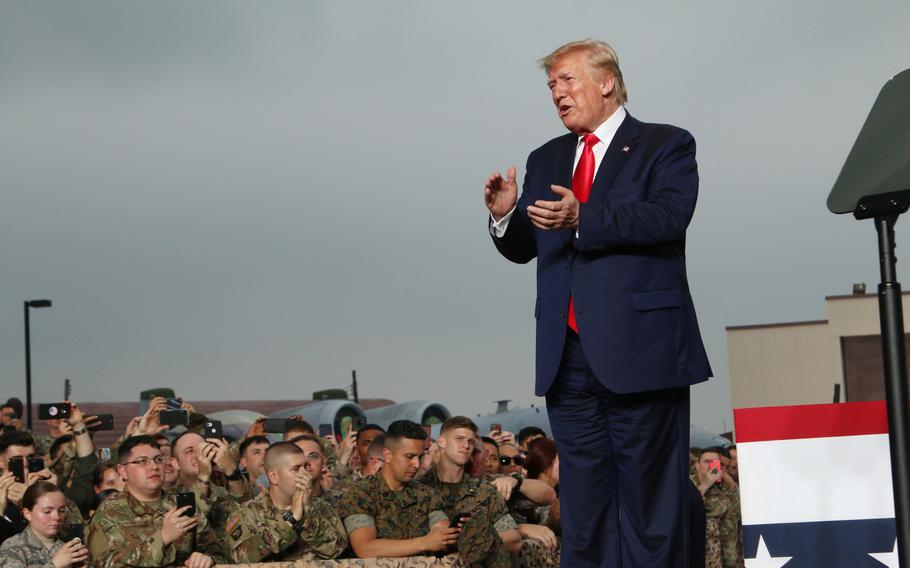
President Donald Trump appears before U.S. service members and their families at Osan Air Base, South Korea, June 30, 2019. (Alaura Lucas/U.S. Army)
The possibility of a second Donald Trump presidency looms over Seoul as the U.S. and South Korea renegotiate the cost-sharing agreement for stationing 28,500 American troops on the Korean Peninsula, according to experts.
U.S. State Department and the Ministry of Foreign Affairs officials last met June 27 in Seoul for the fourth round of talks to determine how much South Korea should spend on American forces in the country, as well as associated construction and civilian labor costs, according to a ministry news release that day.
As president, Trump claimed that maintaining U.S. forces in South Korea costs an annual $5 billion and accused Seoul of not paying its fair share with just $500 million a year.
“It’s got to go up,” Trump said during a Cabinet meeting at the White House on Feb. 12, 2019. “Right now, it costs us $5 billion a year to defend.”
Yang Uk, a research fellow at the Asan Institute for Policy Studies in Seoul, described Trump’s $5 billion price tag as “absurd” and that an overwhelming price hike would not be reasonable unless more conventional military or nuclear assets were deployed to South Korea.
“If the main thing is to deter war with North Korea — which is beefing up its tactical nuclear arsenal — you need a much more dedicated nuclear capacity in theater, which [South Korea] does not have right now,” Yang said by phone Tuesday.
Since its implementation in 1991, the six-year Special Measures Agreement, or SMA, has determined how much Seoul would bear these costs; the current SMA expires at the end of 2025.
The previous SMA expired in 2020; however, due to deadlocked negotiations between Washington and Seoul at the time, officials were not able to come to terms until the following year.
The U.S. military budgeted an annual average $3.3 billion from 2016 to 2019 to station its forces in South Korea, according to a 2021 U.S. Government Accountability Office report.
During the same four-year period, South Korea spent an annual average of $1.45 billion, much of which went toward relocating the bulk of U.S. military assets from Yongsan Garrison in the capital to Pyeongtaek and Daegu city, the report said.
Under the current SMA, South Korea agreed to spend around $900 million in 2020 and over $1 billion the following year. From then on, the cost was raised based on a proportional increase in South Korea’s annual defense budget.
Retired South Korean army Lt. Gen. Chun In-Bum, who served as the director of U.S. affairs at the Ministry of National Defense in 2005, said that while Seoul’s contribution has increased, the fundamentals have remained the same.
“For most of us in the security field, our attitude was that the alliance is important,” Chun said by phone Saturday. “As long as we can support the alliance and the stationing of U.S. forces, we need to do our best to support it. That was our attitude.”
Growing ballistic missile and nuclear weapon threats from North Korea are considered during the SMA negotiations; however, “the major factor is making sure that the U.S. forces on the Korean Peninsula can do their job,” Chun said.
Trump ought to have had a legitimate explanation for an immediate surge in Seoul’s contributions, other than wanting it to pay more, according to Chun.
“Whether it’s $5 billion or $50 billion, if the reason for that increase was explained, that would be much better than a sudden demand for an increase,” Chun said.
He added that South Korea remains the U.S.’s closest ally in the region and noted Seoul already spends over 2% of its gross domestic product for its military, the defense spending guideline for NATO members.
“But it’s not about money,” Chun said. “The Korean military and the U.S. military are part of a blood alliance — not only did American soldiers spill blood on the Korean Peninsula, but Koreans also made great sacrifices during the Vietnam War.”